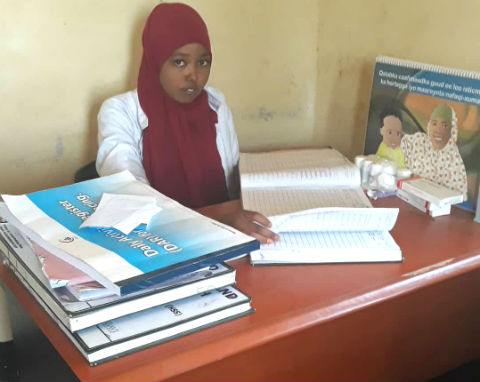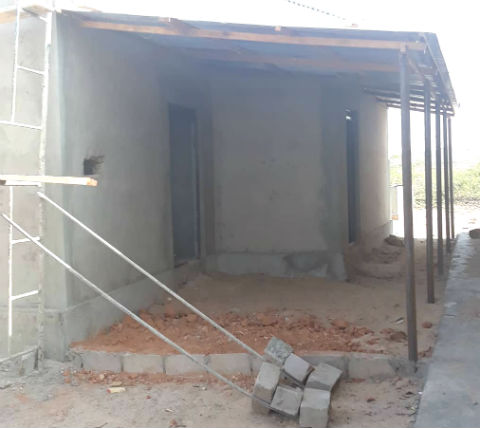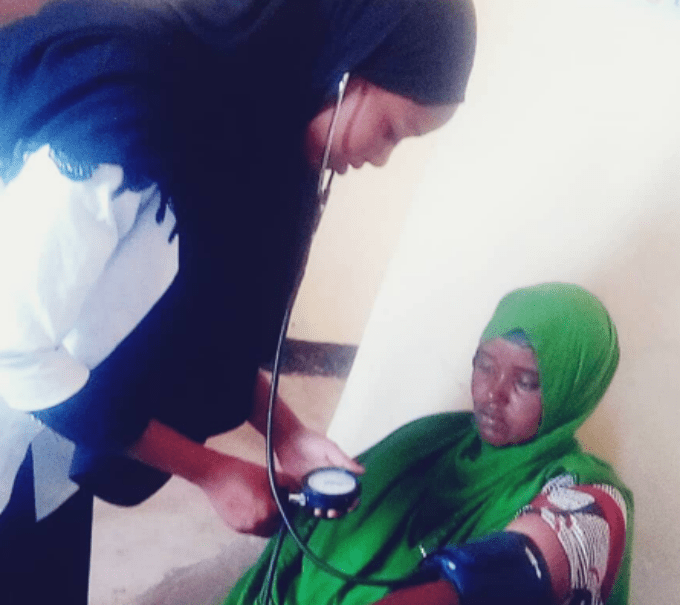Khadra Osman Ahmed is only 22 but she manages the basic maternal and child health unit at Agabar Mother and Child Health Centre single-handedly. The young midwife assists between 10 to 20 women to give birth every month.
“I am the only skilled birth attendant in this area,” said Khadra. Agabar is a rural area situated in the midst of the Golis mountain range in northern Somaliland. The people living in this area are mostly agro pastoralists, earning their livelihoods from raising animals and the production of crops and fruits. The place is surrounded by rocky mountains from all sides, which makes accessibility to bigger cities especially difficult, particularly when it rains. Agabar is only around 60 kilometers north of Hargeisa but the mountains and valleys leads to a journey of around two hours, even with a strong new car.
Khadra only graduated in 2017 from Hargeisa Institute of Health Sciences, a UNFPA-supported institution. “I went back to my home town soon after graduation to help save the lives of mothers and children,” she said.
Though Khadra was committed to devoting her time and skills to her community, with little or no financial support, she said being accepted by her community, as a skilled midwife was not easy. “In the first four months of my practice, the people doubted my skills as they thought I was too young to help women give birth and the pregnant women continued to go to traditional birth attendants (TBA) for assistance in delivering babies,” said Khadra.

Khadra working on records at the health centre
As time went on, the community started testing her skills with complicated deliveries, which could not be managed by the well-known traditional birth attendants. She successfully managed the complicated cases and the community started believing in Khadra’s capabilities.
“The breakthrough happened when I saved the life of a mother who had given birth with the assistance of a TBA but faced complications. The lady successfully delivered the two babies but the TBA thought that in multiple pregnancies, there will be similar number of placentas, one per baby. However, this is often not the case,” said Khadra, adding: “the TBA insisted on delivering a second placenta
After the one placenta was delivered, the TBA started looking for a second one, according to Khadra. “The mother bled profusely and this was when I was called to help,” explained Khadra, adding: “I checked the already delivered placenta which was complete and sufficient for both babies. I realized that the TBA was pulling the uterus out thinking it was the second placenta and that was the cause of the bleeding. I immediately controlled the bleeding and referred the mother to Hargeisa Group Hospital for a blood transfusion.”
The midwife said she followed up the case and was happy to learn that the mother of the twins had recovered well. “She would have died after giving birth if I had not intervened. The mother now attends postnatal care service visits at the health centre,” said a happy Khadra.

the delivery room at the health centre under construction
Now more and more community members are trusting the skills and professionalism of the young midwife and are seeking her services more.
But Khadra’s work is not as smooth as she would like it to be. One of the main challenges she regularly faces is the unavailability of a dedicated delivery wing at the health centre. “This forces me to assist deliveries at home and this is not conducive at all. I am excitingly waiting the completion of the delivery room of the MCH which is now under construction with funds from the diaspora community”, she said.
In the mornings, Khadra attends to women coming for antenatal care services and in the evenings and at night she attends to the emergencies. “Last month, I travelled to Hargeisa for medical reasons and the delivery services again ended up at the hands of the TBAs. More midwives are needed to work in the area to ensure that all mothers can be attended to by a midwife as they give birth,” said Khadra.
Meanwhile a few nurses are tirelessly working in the MCH alongside Khadra. She however remains the only midwife with the knowledge and skills to best benefit mothers and newborns.
-------Adam Haibeh Farah
-------------------------------------------------------
For more information please contact UNFPA Somalia Communications, Partnerships & Donor Relations Specialist Pilirani Semu-Banda on e-mail: semu-banda@unfpa.org


